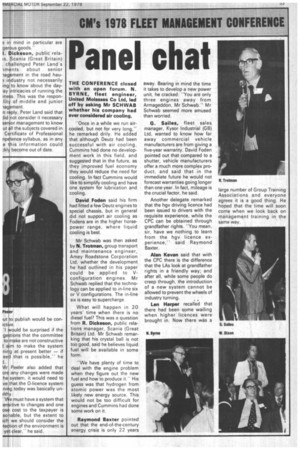Panel chat
Page 35

If you've noticed an error in this article please click here to report it so we can fix it.
THE CONFERENCE closed with an open forum. N. BYRNE, fleet engineer, United Molasses Co Ltd, led off by asking Mr SCHWAB whether his company had ever considered air cooling.
Once in a while we run aircooled, but not for very long," he remarked drily. He added that although Deutz had been successful with air cooling, Cummins had done no development work in this field, and suggested that in the future, as they improved fuel economy they would reduce the need for cooling. In fact Cummins would like to simplify cooling and have one system for lubrication and cooling, David Foden said his firm had fitted a few Deutz engines to special chassis, but in general did not support air cooling as Fodens are in the higher horsepower range, where liquid cooling is best.
Mr Schwab was then asked by N. Trotman, group transport and maintenance engineer, Amey Roadstone Corporation Ltd, whether the development he had outlined in his paper could be applied to Vconfiguration engines. Mr Schwab replied that the technology can be applied to in-line six or V configurations The in-line six is easy to supercharge.
What will happen in 20 years' time when there is no diesel fuel? This was a question from R. Dickeson, public relations manager, Scania (Great Britain) Ltd. Mr Schwab remarking that his crystal ball is not too good, said he believes liquid fuel will be available in some form.
"We have plenty of time to deal with the engine problem when they figure out the new fuel and how to produce it.His guess was that hydrogen from atomic power was the most likely new energy source. This would not be too difficult for engines and Cummins had done some work on it.
Raymond Baxter pointed out that the end-of-the-century energy crisis is only 22 years away. Bearing in mind the time it takes to develop a new power unit, he cracked: "You are only three engines away from Armageddon, Mr Schwab." Mr Schwab seemed more amused than worried.
G. Sailes, fleet sales manager, Kysor Industrial (GB) Ltd, wanted to know how far away commercial vehicle manufacturers are from giving a five-year warranty. David Foden pointed out that compared to a shutter, vehicle manufacturers offer a much more complex product, and said that in the immediate future he would not forecast warranties going longer than one year. In fact, mileage is the crucial factor, he said.
Another delegate remarked that the hgv driving licence had been issued to drivers with the requisite experience, while the CPC can be obtained through grandfather rights. "You mean, sir, have we nothing to learn from the hgv licence experience," said Raymond Baxter.
Alan Kevan said that with the CPC there is the difference that the LAs look at grandfather rights in a friendly way; and after all, while some people do creep through, the introduction of a new system cannot be allowed to prevent the wheels of industry turning. . .
Len Harper recalled that there had been some wailing when higher licences were brought in. Now there was a large number of Group Training Associations and everyone agrees it is a good thing. He hoped that the time will soon come when we look back on management training in the same way.




























































































































